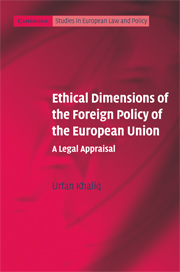Book contents
- Frontmatter
- Contents
- Series Editors' Preface
- Acknowledgements and Preface
- The Constitutional Treaty and the Reform Treaty: Table of Equivalences
- Table of Cases
- Table of Treaties
- List of Abbreviations
- 1 Introduction
- 2 Promoting Values in Foreign Relations: Policy and Legal Issues
- 3 Promoting Values and the International Relations of the Union and Community: Competence and Practice
- 4 Ethical Values and Foreign Policy in Practice: Responses to the Denial of Democracy in Myanmar, Nigeria and Pakistan
- 5 Ethical Values and Foreign Policy in Practice: the Role of the Union in the Middle East Peace Process and Relations with the Palestinian Authority and Israel
- 6 Ethical Values and Foreign Policy in Practice: Humanitarian Aid and the European Union
- 7 Conclusions
- Select Bibliography
- Index
4 - Ethical Values and Foreign Policy in Practice: Responses to the Denial of Democracy in Myanmar, Nigeria and Pakistan
Published online by Cambridge University Press: 03 December 2009
- Frontmatter
- Contents
- Series Editors' Preface
- Acknowledgements and Preface
- The Constitutional Treaty and the Reform Treaty: Table of Equivalences
- Table of Cases
- Table of Treaties
- List of Abbreviations
- 1 Introduction
- 2 Promoting Values in Foreign Relations: Policy and Legal Issues
- 3 Promoting Values and the International Relations of the Union and Community: Competence and Practice
- 4 Ethical Values and Foreign Policy in Practice: Responses to the Denial of Democracy in Myanmar, Nigeria and Pakistan
- 5 Ethical Values and Foreign Policy in Practice: the Role of the Union in the Middle East Peace Process and Relations with the Palestinian Authority and Israel
- 6 Ethical Values and Foreign Policy in Practice: Humanitarian Aid and the European Union
- 7 Conclusions
- Select Bibliography
- Index
Summary
The next two chapters of the book deal with examples of the practice of the Union in its relations with specific third countries. In this chapter, relations with Myanmar, Pakistan and Nigeria are discussed. In all three countries democracy has been interrupted at one stage or another and all have well-documented problems relevant to those values and principles the European Union seeks to promote and protect in third states. The aim in this chapter is to assess how the scope and type of legal and diplomatic instruments selected by the Union to achieve its objectives have been influenced by differing approaches and tactics, as well as geopolitical considerations.
Myanmar
In 1980 the (then) European Economic Community entered into a Cooperation Agreement with the (then) Member States of the Association of South East Asian Nations (ASEAN). With the exception of Myanmar, the Community has subsequently extended relations with those states who have joined ASEAN after the 1980 Cooperation Agreement came into force. In April 2007 the Council issued a mandate to the Commission to negotiate a Free Trade Agreement between the European Community and the ASEAN states. Any such future Agreement, however, as is the case with the 1980 Cooperation Agreement, will not extend to Myanmar. This is due to the existing situation in that country and the Community's long-standing refusal to enter into treaty relations with that country.
- Type
- Chapter
- Information
- Ethical Dimensions of the Foreign Policy of the European UnionA Legal Appraisal, pp. 189 - 273Publisher: Cambridge University PressPrint publication year: 2008



